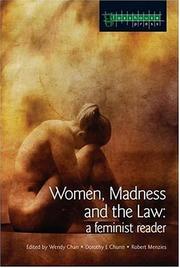| Listing 1 - 5 of 5 |
Sort by
|
Book
ISBN: 144260249X 9781442602496 Year: 2013 Publisher: Toronto
Abstract | Keywords | Export | Availability | Bookmark
 Loading...
Loading...Choose an application
- Reference Manager
- EndNote
- RefWorks (Direct export to RefWorks)
This collection explores the origins and evolution of Canadian citizenship in historical context. It also introduces the more general dilemmas and debates in social history and political theory that inevitably inform these inquiries.
Citizenship --- Birthright citizenship --- Citizenship (International law) --- National citizenship --- Nationality (Citizenship) --- Political science --- Public law --- Allegiance --- Civics --- Domicile --- Political rights --- History. --- Law and legislation --- Canada --- Social policy.

ISBN: 1904385095 Year: 2005 Publisher: London GlassHouse
Abstract | Keywords | Export | Availability | Bookmark
 Loading...
Loading...Choose an application
- Reference Manager
- EndNote
- RefWorks (Direct export to RefWorks)
Book
ISBN: 1841133159 1472565002 128271967X 9786612719677 1847315623 Year: 2010 Publisher: Oxford ; Portland, Oregon : Hart Publishing,
Abstract | Keywords | Export | Availability | Bookmark
 Loading...
Loading...Choose an application
- Reference Manager
- EndNote
- RefWorks (Direct export to RefWorks)
Extensive welfare, law and policy reforms characterised the making and unmaking of Keynesian states in the twentieth century. This collection highlights the gendered nature of these regulatory shifts and, specifically, the roles played by women as reformers, welfare workers and welfare recipients, in the development of welfare states historically. The contributors are leading feminist socio-legal scholars from a range of disciplines in Canada, the United States and Israel. Collectively, their analyses of women, law and poverty speak to long-standing and ongoing feminist concerns: the importance of historically informed research, the relevance of women's agency and resistance to the experience of inequality and injustice, the specificity of the experience of poor women and poor mothers, the implications of changes to social policy, and the possibilities for social change. Such analyses are particularly timely as the devastation of neo-liberalism becomes increasingly obvious. The current world crisis of capitalism is a defining moment for liberal states - a global catastrophe that concomitantly creates a window of opportunity for critical scholars and activists to reframe debates about social welfare, work, and equality, and to reinsert the discourse of social justice into the public consciousness and political agendae of liberal democracies
Income maintenance programs. --- Neoliberalism. --- Poor women --- Public welfare. --- Women --- Legal status, laws, etc. --- Social conditions.
Book
ISBN: 1442619090 9781442619098 9781442648951 1442648953 9781442626454 1442626453 1442619104 Year: 2014 Publisher: Toronto
Abstract | Keywords | Export | Availability | Bookmark
 Loading...
Loading...Choose an application
- Reference Manager
- EndNote
- RefWorks (Direct export to RefWorks)
Since the end of the Second World War, increasing numbers of women have decided to become mothers without intending the biological father or a partner to participate in parenting. Many conceive via donor insemination or adopt; others become pregnant after a brief sexual relationship and decide to parent alone.Using a feminist socio-legal framework, Autonomous Motherhood? probes fundamental assumptions within the law about the nature of family and parenting. Drawing on a range of empirical evidence, including legislative history, case studies, and interviews with single mothers, the authors conclude that while women may now have the economic and social freedom to parent alone, they must still negotiate a socio-legal framework that suggests their choice goes against the interests of society, fatherhood, and children.
Single mothers --- Mothers --- Single parents --- Single women --- Social conditions. --- Legal status, laws, etc. --- Canada. --- Canada (Province) --- Canadae --- Ceanada --- Chanada --- Chanadey --- Dominio del Canadá --- Dominion of Canada --- Jianada --- Kʻaenada --- Kaineḍā --- Kanada --- Ḳanadah --- Kanadaja --- Kanadas --- Ḳanade --- Kanado --- Kanakā --- Province of Canada --- Republica de Canadá --- Yn Chanadey
Book

ISBN: 1442619716 1442619708 1442626623 1442649208 Year: 2022 Publisher: Toronto : University of Toronto Press,
Abstract | Keywords | Export | Availability | Bookmark
 Loading...
Loading...Choose an application
- Reference Manager
- EndNote
- RefWorks (Direct export to RefWorks)
An exceptional showcase of interdisciplinary research, Critical Inquiries for Social Justice in Mental Health presents various critical theories, methodologies, and methods for transforming mental health research and fostering socially-just mental health practices.
Mental health services --- Social justice --- Mental Health Services. --- Research.
| Listing 1 - 5 of 5 |
Sort by
|

 Search
Search Feedback
Feedback About UniCat
About UniCat  Help
Help News
News